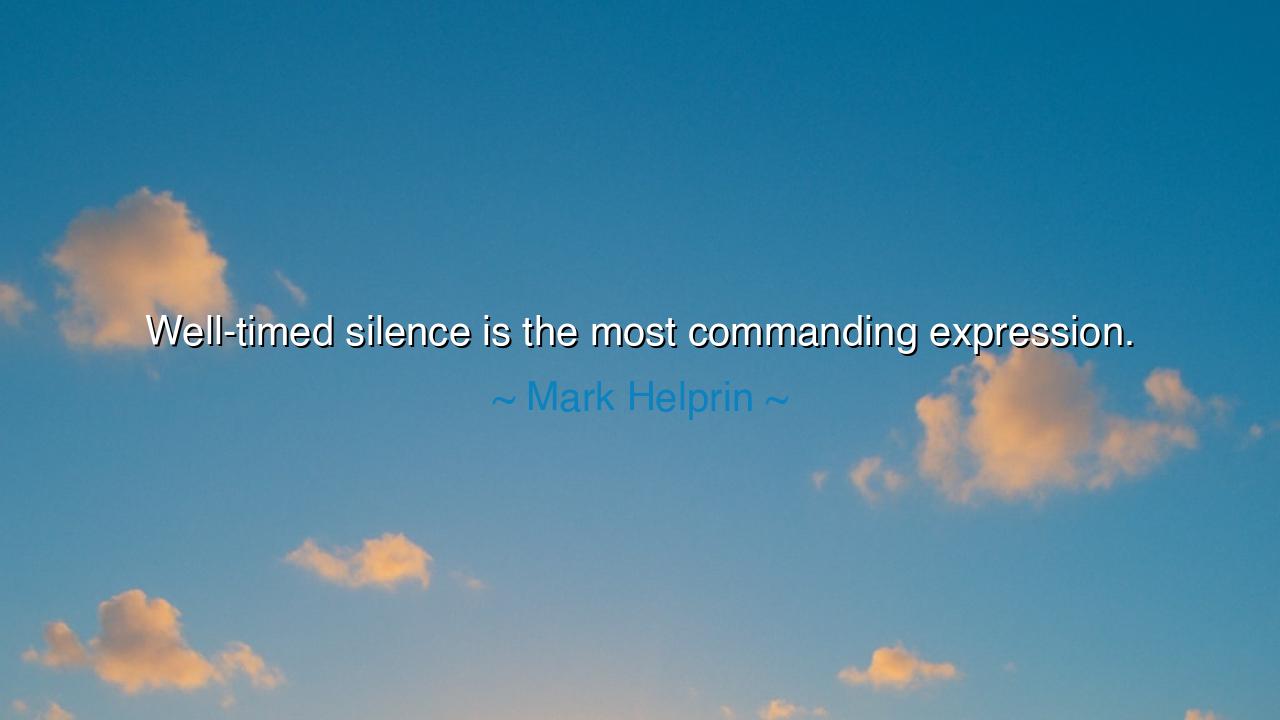
Well-timed silence is the most commanding expression.






Mark Helprin, the novelist and essayist of deep perception, once declared: “Well-timed silence is the most commanding expression.” These words strike with the force of wisdom, for they remind us that silence, when chosen with care, can wield more power than the loudest speech. Words may stumble, grow excessive, or lose their force, but silence—when it descends at the right moment—becomes like thunder in the soul. It is a force that demands attention, compels reflection, and asserts presence without sound.
The origin of this saying lies in Helprin’s broader meditations on life, beauty, and human conduct. As a writer who cherished precision, he knew that expression does not always lie in abundance, but often in restraint. Well-timed silence is not weakness, nor absence; it is the sharpest tool of communication, able to cut through noise with its very stillness. In the courts of kings, in the chambers of debate, in the intimacy of love, the moment of silence has so often spoken more than a thousand words.
History offers us luminous examples. Consider Abraham Lincoln at the height of the American Civil War. Often criticized for his pauses and long silences before speaking, he allowed moments of stillness to settle upon the room until his listeners leaned forward, waiting. In those gaps, his silence held more gravity than the clamor of his opponents. When he finally spoke, each word carried the weight of mountains. His mastery of silence gave his words a power unmatched.
Or look further back, to the trial of Socrates. Surrounded by accusers who hurled words like stones, Socrates often stood in silence, unshaken. His calm refusal to meet noise with noise commanded more respect than the speeches of his enemies. Even in facing death, his pauses and silences forced his judges to confront the truth of their own injustice. By refusing to fill every moment with words, Socrates made silence a shield, a mirror, and a weapon.
The deeper meaning of Helprin’s words is this: true command does not come from endless assertion, but from discernment—knowing when to speak, and when not to. Many squander their strength by constant talking, mistaking volume for power. Yet silence, chosen wisely, creates a space in which meaning deepens. It unsettles the arrogant, humbles the boastful, and compels the attentive to listen with new ears. It is not emptiness but fullness—an invisible presence that dominates without force.
The lesson is clear: do not fear silence, nor rush to fill it. Instead, learn its rhythm, its weight, its ability to magnify your presence. In moments of conflict, let silence disarm the aggressor. In moments of love, let silence carry what words cannot express. In moments of thought, let silence prepare the soil from which wisdom may bloom. Well-timed silence is the ally of the wise, the weapon of the strong, the refuge of the contemplative.
Practically, this means training oneself to pause before speaking, to measure words, and to resist the compulsion to answer instantly. In conversations, silence can show confidence. In arguments, it can reveal the weakness of the other side. In leadership, it can create awe. Begin by practicing the art of waiting a heartbeat longer than comfort allows, and you will find that your presence grows stronger, your words sharper, and your influence deeper.
So remember, children of tomorrow: well-timed silence is the most commanding expression. Do not scatter words like leaves in the wind. Speak when you must, but let silence be your companion, for it is the hidden language of strength. Let your silences resound like bells in the hearts of those who hear them, and you shall command not by noise, but by the majesty of restraint.






AAdministratorAdministrator
Welcome, honored guests. Please leave a comment, we will respond soon